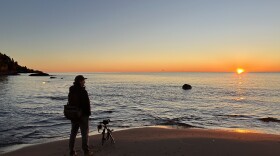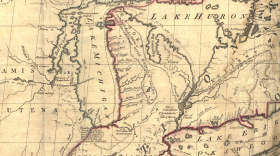-
When U.P. snowboarder Nick Baumgartner lost in a qualifying round at the 2022 Olympics, he broke down on national TV. It was his fourth Olympics, he’d never medaled, and he was 40 years old. He might not get another shot at a medal. But then he got some news.
-
Edmonia Lewis, the first globally-recognized sculptor of African American and Native American descent, achieved critical acclaim for her masterpiece, “The Death of Cleopatra.” But over a hundred years ago, it disappeared.
-
Lake Superior can change in a heartbeat; one minute it’s calm ― the next it's a raging storm. When people in the water get caught off-guard, rescuers have to balance being the hero and knowing when to call it quits.
-
For almost seven years, Bugsy Sailor has been on a mission to watch every sunrise. But now, he wonders if the inspiration that started this project will also be the thing that ends it.
-
November 10, 1975: The SS Edmund Fitzgerald sinks in a massive storm on Lake Superior. But just miles away, a few fishermen are struggling in the same storm — fighting for survival.
-
In October 1960, Prince Akihito of Japan visited Chicago for 21 hours. Chicago’s mayor presented the prince with a diplomatic gift: 18 bluegill. What happened next would change the underwater world of Japan forever.
-
On a remote island in Lake Michigan, some old apple trees could have very rare, never-before-discovered genes. And if they do, they could join the U.S. stockpile of apples poised to fight off future threats.
-
Buildings and light pollution are taking a heavy toll on migrating birds. Some cities in the Midwest and Great Plains are working to fix that.
-
In one of the most polluted parts of Lake Michigan, whitefish are thriving. Some people wonder if we should try to replicate that environment elsewhere to save the iconic species. But that could mean doing something untested and controversial.
-
In the early 1800s, a group of politicians decided part of the Ohio border should move farther north. It started a decades-long border fight between Michigan and Ohio. There were winners. There were losers. And in the end, it shaped the states as we know them.
Play Live Radio
Next Up:
0:00
0:00
Available On Air Stations










